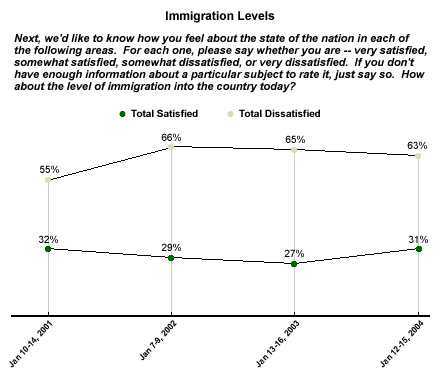For hundreds of years, immigrants have been leaving their homelands to find better lives in the United States, but the surge in immigration (particularly the illegal variety) during the last 20 years has likely played a role in many Americans becoming dissatisfied with the current level of immigration.
According to Gallup's annual Mood of the Nation poll, conducted in January 2004*, 63% of Americans report being dissatisfied with the level of immigration in the country today, while 31% are satisfied. At least a majority of Americans have been dissatisfied since the question was first asked in January 2001, with a measurable spike in dissatisfaction appearing after the Sept. 11 terrorist attacks (which were carried out by people who had allegedly immigrated illegally or legally into the United States). Dissatisfaction with immigration levels has remained above 60% since January 2002.

When asked what should be done about current immigration levels into the United States, nearly half of Americans (49%) say they should be decreased, while 42% want them kept at their current levels and just 8% say they should be increased. Among the percentage who are dissatisfied with the level of immigration today, the lion's share want to see immigration decreased. Specifically, 70% of Americans who are dissatisfied with the level of immigration want to see it decreased, just 5% of those who are dissatisfied want more immigration.
The current percentage of Americans who want to see immigration levels decreased has declined somewhat from its January 2002 peak (58%), which almost certainly reflected the effects of the Sept. 11 attacks. In the January before the attacks, 45% of Americans wanted to see immigration levels decreased.
Are Americans Anti-Immigration?
But while nearly half of Americans say they'd like to see immigration decreased, most don't believe that immigration is a bad thing per se. Gallup's 2003 survey on minority rights and relations found that 58% of the public says that immigration is a good thing for the country today, while 36% consider immigration a bad thing**.
The country's historic tradition of welcoming immigrants may be a factor here. According to another question asked in June 2003, 75% of the public believes that immigration has been a good thing for America in the past, while just 21% think it has been a bad thing.
But that sense of inclusiveness runs up against Americans' ongoing concerns about the economy. The majority of Americans say immigration does more harm than good to the U.S. economy. A January 2004 survey finds a majority of Americans (65%) saying that "immigrants hurt the economy by driving down wages for many American workers." Just 30% take the view that "immigrants mostly help the economy by providing low-cost labor."*** At the same time, Americans show strong consensus that immigrants are more likely to take low-paying jobs Americans don't want (77%) than to take jobs American workers would want for themselves (14%).
What About President Bush's Plan?
In an attempt to address the many legal and economic facets of this issue, President George W. Bush has proposed a plan that would allow some illegal immigrants to stay in the country legally, as long as they hold jobs that no U.S. citizen wants. The legislation would also require immigrant workers to return to their countries after a specified amount of time.
This plan seems to be an attempt to offer the best of both worlds -- allowing immigrants to come to this country and potentially fuel the economy, while also ensuring that American jobs are not threatened. But according to a February 2004 survey, many Americans aren't ready to give their blessing to the idea -- more Americans oppose the plan than favor it, by a margin of 51% to 46%****.
This reluctance to support this "best of all worlds" policy underscores Americans' conflicted views on immigration. While they believe in general it is a good thing, they are very reluctant to want to see more of it. And while they agree that immigrants are generally not taking jobs away from Americans, they believe it does more harm than good to the U.S. economy.
*Results are based on telephone interviews with 1,004 national adults, aged 18 and older, conducted Jan. 12-15, 2004. For results based on the total sample of national adults, one can say with 95% confidence that the margin of sampling error is ±3 percentage points.
**Results are based on telephone interviews with 1,385 national adults, aged 18 and older, conducted June 12-18, 2003, including oversamples of blacks and Hispanics that are weighted to reflect their proportions in the general population. For results based on the total sample of national adults, one can say with 95% confidence that the maximum margin of sampling error is ±3 percentage points.
***Results are based on telephone interviews with 1,003 national adults, aged 18 and older, conducted Jan. 9-11, 2004. For results based on the total sample of national adults, one can say with 95% confidence that the margin of sampling error is ±3 percentage points.
****Results are based on telephone interviews with 1,002 national adults, aged 18 and older, conducted Feb. 9-12, 2004. For results based on the total sample of national adults, one can say with 95% confidence that the margin of sampling error is ±3 percentage points.
